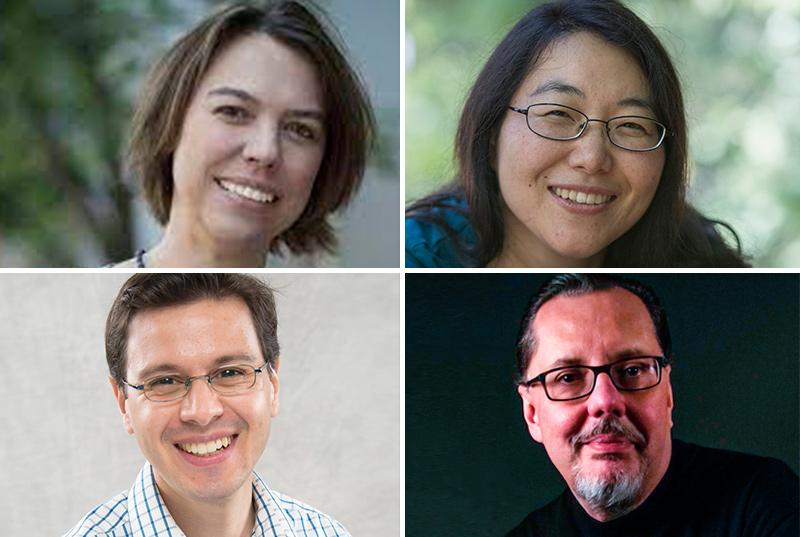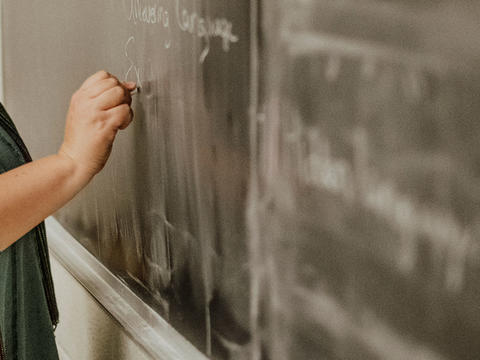Casey Londergan and Colleagues Win Cottrell Scholars Collaborative Award

Haverford Professor of Chemistry Casey Londergan is one of 11 collaborators who recently earned a Cottrell Scholars Collaboratives Award to explore new models of teaching physical chemistry. Photo by Patrick Montero.
Details
The chemistry professor and his team of collaborators from institutions across the country have been selected for a grant that will support the creation of new models for teaching physical chemistry.
Have you seen the bumper stickers that say, “Honk if you passed PChem?”, referencing the notoriously difficult physical chemistry course that is required by all chemistry programs? Haverford Professor of Chemistry Casey Londergan has, and he wants to do something about them, helping his students move beyond “passing PChem as a brutal rite of passage towards something more exciting.”
So he has collaborated with 10 other chemistry professors from differently sized institutions across the country to develop a project, "Lowering Activation Barriers to Success in PChem (LAB-SIP): Towards Better Access to Creative Practice for Students in a Re-envisioned and Re-invigorated Physical Chemistry Curriculum," which recently received funding from the Research Corporation for Science Advancement as part of its Cottrell Scholars Collaborative Awards.

The Cottrell Scholars Collaborative is a cross-disciplinary network of Cottrell Scholars—outstanding teacher-scholars who have been recognized for their innovative research—working in teams on projects with potential high impact. For the next two years, it is providing $25,000 to Londergan’s team to develop new ways to teach physical chemistry.
“Our collective goal as instructors of physical chemistry is to help move our community towards new models and new ways to teach PChem so that it invites students in—rather than intimidating them with math and experiments from the past—and provides exciting ways for them to exercise their own agency and creativity, while learning the two basic ideas of physical chemistry—thermodynamics and quantum mechanics—and growing their quantitative and computational tool sets,” he said.
The mechanism by which his team plans to do that is a series of community workshops in which Londergan and his colleagues hope to understand how instructors are currently teaching physical chemistry, and then come to consensus about the best new models for teaching and the resources that they will require, which the group will then work to create.
“We hope that this two-year initiative will provide the seed for a much longer-lived initiative in our community that can eventually touch most students of PChem across the U.S. and, potentially, also around the world,” said Londergan.
Physical chemistry is an important part of chemistry education because it is where students learn the properties of atoms and molecules and how chemical reactions work. Therefore, it has many uses across all chemistry subspecialties and many industries, as well as throughout biological sciences. But the way it has been taught often makes it feel like something to “get through” instead of a lively introduction to a critical field with many applications.
“PChem approaches and techniques can literally be applied to almost any major problem, from creating better solar cell materials to understanding how proteins interact in the body, and from purifying large quantities of water to understanding how water's electrons determine its unique properties,” said Londergan. “But PChem is most typically taught using a dry and stepwise approach that relies on experiments and phenomena that were ‘current physical chemistry’ more than 50 years ago. I hope that we can find a way for students to learn in a context of current physical chemistry, which relies centrally on computation—including as a replacement for by-hand mathematical models that students are most typically taught—and provides many ways for students to get excited about learning its tools.”

The team undertaking this work includes Carlos Baiz from the University of Texas, Rob Berger from Western Washington University, Linda Columbus of the University of Virginia, Julio de Paula from Lewis and Clark College, Kelling Donald from Richmond University, Stephen Fried from Johns Hopkins University, Dmitri Kosenkov from Monmouth University, Brenda Rubenstein of Brown University, Grace Stokes of Santa Clara University, and Kana Takematsu from Bowdoin College.
For more on the Cottrell Scholars Collaborative: rescorp.org/cottrell-scholars/cottrell-scholars-collaborative.



